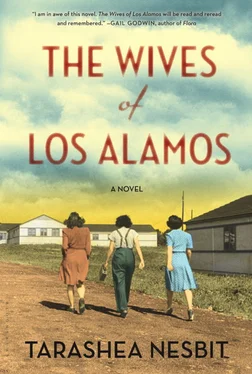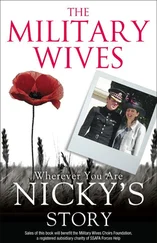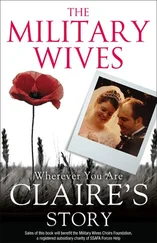HOW WELL OUR husbands knew science determined their status, which was indicated by how much access they had to secrets. We learned after the war that their security access was marked by the color of their badge. They wore white badges or they wore blue badges; they knew what was going on, or they only knew what they needed to in order to do their job. We knew close to nothing, though we speculated about who knew the most. Many of our husbands were physicists, and some of us guessed by who spent more time thinking than talking who had the high-status position of theoretical physicist. Some men we knew from before Los Alamos and we were happy to see them again. We could remember bits of their previous interests: one had investigated cosmic rays and now spent his days in a shack at the bottom of a canyon, another had conducted experiments related to radioactivity and, like our husbands, went to the Tech Area each morning.
IF WE INVITED more people to dinner than we had table space for, our husbands went out an hour before the guests arrived and found a piece of wood, sawed it down, and built an extension leaf. When the scientists, our husbands, arrived to Ingrid’s house stomping their boots on the porch and calling to her husband, Congratulations! while holding up bottles of liquor, which should have been dificult to find in this time of rationing, we had no idea what they were talking about. Ingrid asked Henry why he was being congratulated, and we asked our husbands why they were congratulating him, but our husbands just shrugged, and then smiled; we scoffed and walked away. We went, next, to one of the female scientists, Irene, a sturdy young girl with short hair and blunt bangs, who was said to have a spectacular IQ; surely another woman would tell us. We asked her, What’s all this about? And she raised her head, looked down at us—she was quite tall—and said, smiling, Why, he shot down a Jap battleship! And earlier that day the Army radio station had reported that the U.S. military destroyed four Japanese carriers and a cruiser, but our husbands had been here all along, and so what that female scientist said was surely impossible. She was pulling our leg, though it felt like more than that.
WE THOUGHT, YOU are making fun of me , and we concentrated our faces in the other direction so she would not see our wobbly chins, because we were inexplicably starting to tear up, we were becoming too emotional, and she was poking fun at what we did not know and we were losing our wits. Who cares about her , we thought. When she turned toward a man with whom she could converse about science, toward our husbands, and our husbands touched her shoulder as they spoke, we told ourselves we hated her.
BEFORE WE GOT married we asked our grandfathers, whose own marriages had lasted forty years or more, What is the secret to a happy marriage? And they paused, looked down at their chicken salad, and said, You have to really like each other. After the attraction, you have to really like the person . We crunched our lettuce. Our teeth clinked against the fork. Did we like our fiancés? What does liking someone mean? Before we got married our mothers told us we had to communicate. Ask him how his day was. Take an interest in his profession . But we could not do this anymore. Our husbands were gone for twelve hours a day and sometimes did not come home at all. Instead they dragged an Army cot—identical to our own beds—into the Tech Area. And we were not allowed to ask questions.
What did we think our husbands were doing in the lab? We suspected, because the military was involved, that they were building a communication device, a rocket, or a new weapon. We ruled out submarines because we were in the desert—but we closely considered various types of code breaking.
THE ALTITUDE MADE our breads flat. We requested hot plates, and they arrived, and we carried them with us to parties. Posters of corn that said corn is the food of the nation! lined the Lodge walls and we made so much corn bread, corn cakes, corn casserole, and corn with pepper that we were soon sick of corn.
WE NAMED OUR stoves after an autobiographical memoir told by a horse—one that began with his carefree days as a youth, moved to his difficult life pulling cabs in London, and ended with his happy retirement in the country. All along he recounted tales of cruelty and kindness. We named our stoves Black Beauty and snorted with laughter. Or we called it that because everyone else did, though we did not get the reference, or we refused to call it that. Mostly, we thought our stove was huge and ugly and we only loved it when the electricity went out, because since it was heated with wood and coal, we could still continue cooking dinner even if we had no power. At first, before we became savvy with our stove, we would go without supper. Sometimes there were no lights in the streets, and no flashlights to carry around, and it was dark all through town, but never quiet, and families were reading aloud, and there was candlelight, and we heard the laughter of children being tickled.
SOME OF US hated the stove situation so much we complained, and we asked for a new stove, an electric one, and if our husbands had high security clearance, something might be done about it. We called the Housing Office and heard the Army man’s voice gurgle and we guessed he had been celebrating some small military victory. This seemed to happen every day, but we thought it was really just an excuse to celebrate the enjoyment of liquor. Maybe this time it was something about the Allies landing in Anzio, or some other sign that might indicate we were beating the Germans. Although winning could be worthy of celebration we still needed a new stove.
THE ARMY MAN said a stove would come that day, and it did not come; he said a stove would come the next and it never came. And therefore it is possible we took matters into our own hands. Late one Sunday night, when the town was still groggy from the weekend, we gathered with Louise, Starla, Ingrid, and Katherine. We made a furniture dolly with two-by-fours, a scrap of carpet, and four wheels borrowed from Louise’s sofa. Perhaps we went into the common area and took what we needed, and felt the thrill of doing things we were not supposed to do, and it is possible we experienced this thrill more than once.
SOME OF US had not always been Americans. Our husbands went from being Hans to Jack, and we went from being Mrs. Mueller to Mrs. Miller. We changed out of slacks and into blue jeans, and already we felt more like Americans. But we were still Europeans, too.
WE SAT ON hay bales in Fuller Lodge and watched short films put out by the War Department that were aired before the featured movies. We wanted to watch Meet Me in St. Louis but we had to suffer through films that asked, Why are we Americans on the march? Pearl Harbor, is that why we are fighting? Or is it because of Britain? France? China? The list continued for at least ten more countries.
THE ANSWER TO the question was: For freedom. They say trouble always comes in threes—look at these faces . And we saw Mussolini, Tojo, and Hitler at podiums, in front of hundreds of people, speaking. They gave up their power , the film said, and they meant non-Americans, citizens of other countries. Some of us had extended families that were still in Germany, France, Norway, Poland, Holland, Greece, Belgium, and elsewhere. Or we were born in the U.S. and the film did not seem strange to us.
WE WERE ITALIANS and we clenched our teeth; or we were Germans and we laughed out loud when we heard, Germans have a natural love of regimentation and harsh discipline ; or we were not surprised. But when the film said, German defeat was never acknowledged in the last war and they were ready to back anyone who would obtain victory for them , we wished these silly theatrics would hurry up so we could escape into the stories of Holiday Inn , Slightly Dangerous , or My Sister Eileen. And if we had been brave, if we had wanted to make a scene, to say This is wrong , we would get up from our hay bale and walk out. But where would we go and whose mind would it have changed? We would be back in our drafty living room with only our own suffering—missing the film and worrying that our new friends might think us suspect.
Читать дальше












